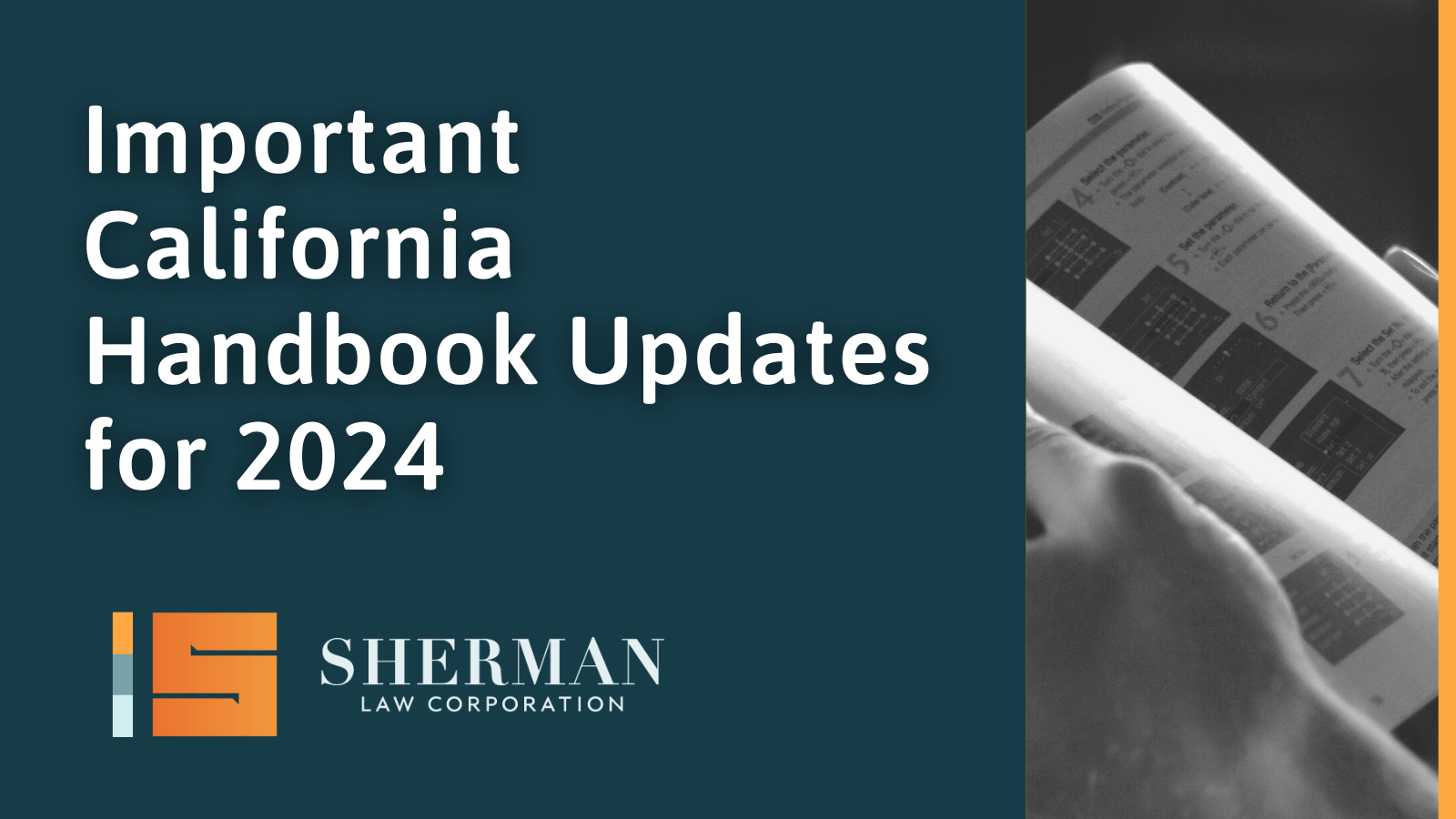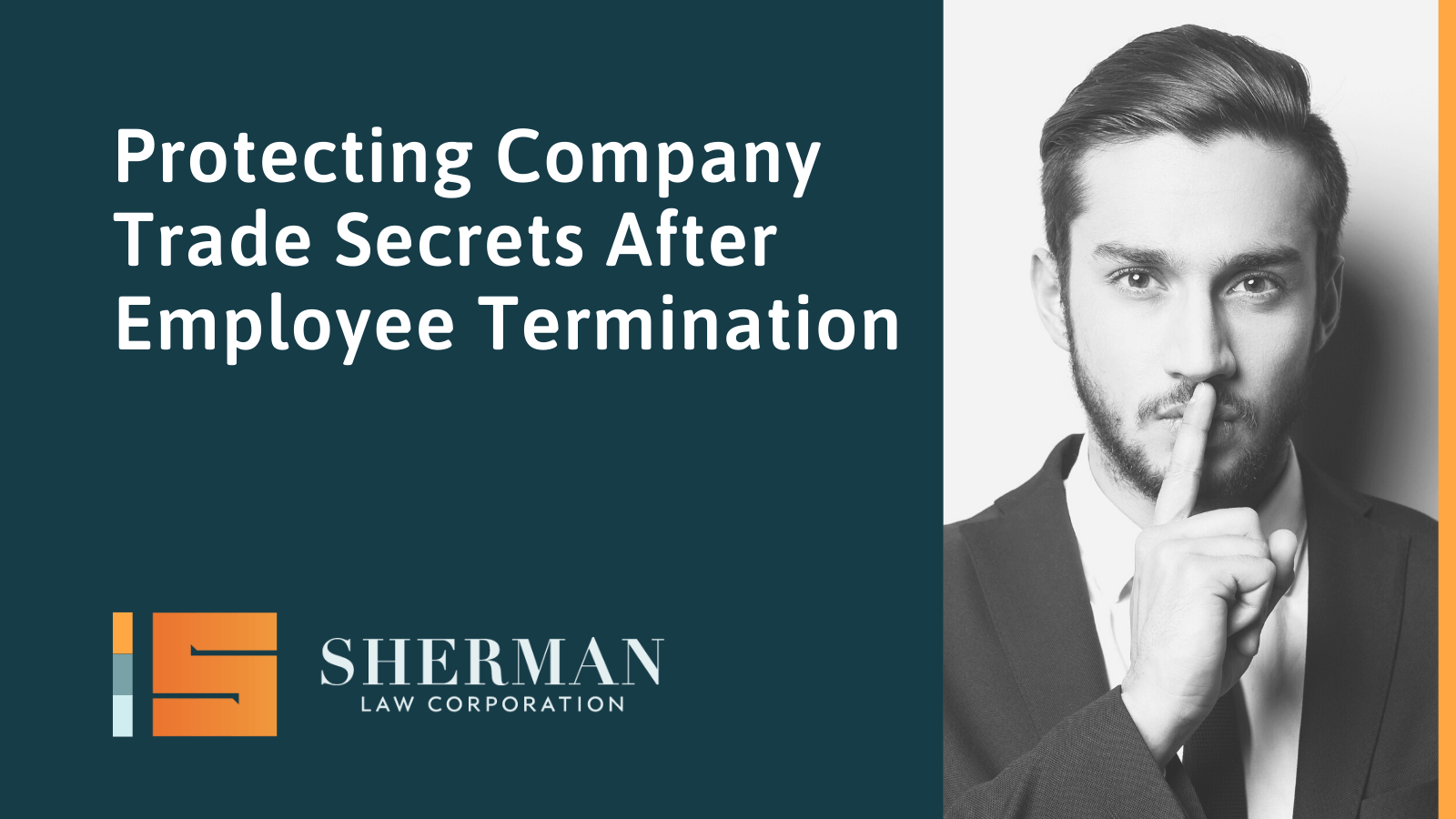
We are always asked at cocktail parties the loaded question what are the hot button employment topics and what can employers do proactively to minimize exposure. Employment law nationwide continues to skyrocket with California leading the pack. Here are our top ten “hot topics” in employment law.
Compliance With 2017 Laws
Hiring
Unlawful Verification of Right to Work (SB-1001)
- SB 1001 prohibits an employer, in the course of verifying authorization to work, from: (1) requesting more or different documents than are required under federal law; (2) refusing to honor documents that on their face appear reasonably genuine; (3) refusing to honor documents or work authorization based upon the specific status or term of status that accompanies the authorization; and (4) attempting to re-investigate or re-verify an employee’s authorization using an unfair immigration-related practice. The new law protects applicants for employment in addition to employees. Now, employers who refuse to honor documents presented for I-9 or re-verify can be penalized up to $10,000 per violation.
Juvenile Arrests and Convictions Prohibited. (AB 1843)
- Employers may not inquire into or use information regarding an applicant’s juvenile criminal background, including, juvenile arrests, detentions or adjudications. There remains an exception for health facilities, which have a right to inquire about certain juvenile offenses unless the record has been sealed by a juvenile court.
Compliance Tip
Train Supervisors & Review Hiring Packets to Comply.
Employment Agreements
Restrictions against non-California forum and choice of law provisions in Employment Agreements. (SB 1241 adds Labor Code §925)
- As of 1/1/17, employers are prohibited from requiring California employees to adjudicate claims outside of California or to submit to the laws of another state. Section 925 applies to all employment contracts, including arbitration agreements, that are entered into, modified, or extended on or after January 1, 2017. The only exception is where the employee had individual attorney representation in negotiating the employment agreement. Employees who enforce their rights under Section 925 may be awarded attorneys’ fees. Section 925 will effectively preclude most efforts to apply restrictive covenants or to otherwise avoid unique California law through foreign forum or choice of law clauses. Moreover, employers should avoid terminating employees for refusing to sign agreements that would violate Section 925.
Compliance Tip:
Update all employment agreements with out-of-state forum and/or laws applied.
Wage and Hour Changes
Fair Pay Act Extends to Race and Ethnicity (AB 1676 & SB 1063)
- The Fair Pay Act, which became effective January 1, 2016, prohibits paying an employee of one gender less than an employee of the opposite gender for substantially similar work in terms of skill, effort and responsibility. Starting January 1, 2017, that law has been expanded to prohibit compensation differences among members of different races and ethnicities performing substantially similar jobs. However, the Fair Pay Act does not prohibit pay differences where the compensation differential can be attributed to: 1) a seniority system; 2) a merit system; 3) a system tying earnings to output, like a commission-based compensation system; or 4) any other bona fide factor such as education or experience. It expressly provides, however, that an employee’s prior salary alone is not a bona fide factor justifying a salary disparity.
Compliance Tip:
Audit employee salaries and retain all records justifying any disparity in salaries earned by employees of different genders, races or ethnicities immediately.
California Minimum Wage & Minimum Salary Increase (SB 3)
- Although many California cities have ordinances providing for a higher minimum wage than state law requires (and many of these minimums will increase in 2017), California’s state-wide minimum hourly wage was set to hold steady at $10.00 for several years. Now, SB 3 establishes incremental minimum wage increases over the next three years. Beginning Jan. 1, 2017, employers with 26 or more employees must pay non-exempt employees a minimum wage of $10.50 per hour, with the rate reaching $15.00 per hour in 2022. Smaller businesses are not required to begin the scheduled increases until 2018.
- A significant impact of this change involves the minimum salary required to be paid to exempt employees. The California requirement has long been, and remains, two times the minimum hourly wage based on a 40 hour workweek (regardless of how many hours the exempt employee actually works). Thus, for larger employers, beginning Jan. 1, 2017, the California minimum salary for exempt employees is $840 per week, or $43,680 per year. By 2022, the amount will increase to $62,400 per year.
- California employers should also be aware of the increased minimum salary requirements for the computer software employee exemption. The California Department of Industrial Relations recently announced that it has adjusted the computer software employee’s minimum hourly rate of pay exemption from $41.85 to $42.35, the minimum monthly salary exemption from $7,265.43 to $7,352.62, and the minimum annual salary exemption from $87,185.14 to $88,231.36—all effective January 1, 2017.
Compliance Tip:
Audit all payrolls to ensure compliance with minimum thresholds.
Overtime Pay/Meal & Rest Periods for Agricultural Workers. (AB 1066)
- This new law eliminates the exemption from wage and hour, and meal and rest break requirements for agricultural workers for employers with 26 or more employees starting 1/1/19. It phases in overtime compensation requirements for these workers over a four-year schedule that varies with the employer’s size.
Compliance Tip:
Coming soon…
Reporting- Wage Statements
- Under AB 2535, exempt employees are expressly excluded from the requirement to include on itemized wage statements total hours worked.
Compliance Tip:
Although not required, keeping track of hours worked for all employees, including, exempt employees, is the most effective manner of defending attacks on exempt classification.
Postings & Notices
Gender-Neutral Bathrooms
- Effective March 1, 2017, AB 1732 requires all single-user restrooms in any business establishment, place of accommodation, or government agency in California to be branded as all gender, and bars any single-user bathroom to be designated as male or female only.
Compliance Tip:
Post gender neutral signs, if applicable by 3/1/17.
Notice to Employees of Rights Concerning Domestic Violence/Stalking (AB 2337)
- Existing law prohibits an employer with 25 or more employees from discharging, discriminating, or retaliating against an employee who is a victim of domestic violence, sexual assault, or stalking because he or she takes time off from work to address the situation. AB 2337 requires that employers provide written notice of these rights to new employees upon hire, and to current employees upon request. The law obligates the Labor Commissioner, by July 1, 2017, to develop and post on its website a form notice that employers can use to satisfy this requirement. The employer’s obligation commences at the time the Labor Commissioner posts the form, but no later than July 1, 2017.
Compliance Tip:
Update handbooks, post and give notice upon hire to new employees by 7/1/17.
Mandatory Retirement Savings
- SB 1234, the “California Secure Choice Retirement Savings Trust Act,” will require employers with five or more employees that do not offer specified retirement plans to sponsor a state-administered retirement plan. Covered employers will be required to automatically enroll employees into a state-sponsored program administered by the newly created California Secure Choice Retirement Savings Investment Board. The 7-person board is to be appointed immediately. The program will be established only if and when the board finds that the system will be self-sustaining, qualifies for favorable federal tax treatment, and is not considered an employment benefit plan under the federal Employee Retirement Income Security Act (ERISA).
Compliance Tip:
Before that determination is made, nothing is required of employers. After that determination is made, the Employment Development Department (EDD) will administer the program, including informing employers of their obligations and making forms available to employees to opt in or to opt out.
Leave
Paid Sick Leave Local Ordinances
In addition to the California state-wide sick leave law that became effective on Jan. 1, 2015 (with accrual beginning on July 1, 2015), the following California cities now have sick leave ordinances applicable to some or all of the employees working within their boundaries: Berkeley, Emeryville, Oakland, City of Los Angeles, County of Los Angeles, San Diego, San Francisco, Santa Monica. Often the ordinances are passed in conjunction with a higher local minimum wage. No two ordinances are exactly the same and San Francisco’s was recently revised. Employers with employees in some or all of those cities or counties must comply with both state law and the applicable city/county ordinance.
Compliance Tip:
Review both the paid sick leave law (including FAQ’s), and review the local ordinances to determine if covered and compliant. Update handbooks and policies to comply, giving notice to employees.
Drug-Free Workplaces & New Marijuana Law (Proposition 64)
- When California voters passed the “Control, Regulate, and Tax Adult Use of Marijuana Act” (the “Act”), commonly known as Proposition 64, the recreational sale, possession and use of marijuana by adults 21 years and older was legalized under state law. While the recreational sale of the drug will not commence in the state until at least Jan. 1, 2018, at present it is legal for adults to use marijuana in their private residences, possess up to 28.5 grams of the drug, and grow up to six plants indoors. In other words, employees in California are no longer prohibited under state law from consuming the drug under limited circumstances. Possession, use and sale of the drug remains illegal under federal law.
- The Act contains specific language that allows California employers to develop or maintain drug-free workplace policies. The Act applies equally to employers who have employees who use for medical and non-medical reasons. It does not require an employer to allow or accommodate the use, consumption, possession, transfer, display, transportation, sale, or growth of marijuana in the workplace, or prevent employers from complying with state or federal law.
- The Act specifically allows employers to continue pre-employment screening and limited testing of current employees. Under existing California law, pre-employment drug testing is permitted if the employer screens all applicants. Employers can also randomly test employees who perform safety-sensitive jobs, if there is a reasonable suspicion that the employee is under the influence, and where required under federal law.
Compliance Tip:
Employers with California operations may continue enforcing their drug-free workplace policies regardless of whether their employees use marijuana for medical or recreational purposes. Because the rules concerning post-employment testing are currently under scrutiny by OSHA, and are complex and require fact-specific analysis to avoid invasion of privacy claims under the California Constitution, review of testing policies and procedures with counsel is recommended. California employers should revisit their drug and alcohol policies to ensure they have appropriate policies and procedures in place consistent with the desired approach for treating marijuana in the workplace. Employers can also have policies indicating that, like alcohol, marijuana cannot be consumed during the work day, and that an employee cannot come to work under the influence of marijuana.”
Employers with no such policies should make a strategic determination about how much control it wants to exude over employee use and develop policies that prohibit use, or update existing policies. Employers that do not already have a drug testing program should consider implementing one, and the consequences for breach of the policy or a positive test should be determined. Training of supervisors concerning the policy and recognizing the signs of impairment is also recommended. Finally, communicate the updated policy to employees.
Your Company’s Data Could Be Just About Anywhere Because Everyone Uses Their Personal Devices
No employer is immune from technology and the issues that arise in the workplace. Employers must fully audit their technology, and the technology used by each employee, whether they are aware of it or not, and gain control of all Company information, digital and paper, and the technologies that will be permitted going forward to conduct work. In addition, rein in the amount of data with retention policies, procedures & processes in place.
From there, policies, processes, and plans must be developed to control all Company information. This includes,
- Instituting Customized Technology Use and update all other policies that involve Company information. This includes addressing new technologies, such as wearables like apple watches, fitbits, and data stored in clouds and other places.
- Developing forms, policies, protocols, and agreements for issuance and use of Company issued and personal devices, including, bring your own device protocols, policies, processes and agreements.
- Reviewing employer surveillance, including, location based tracking via GPS enabled devices addressing privacy issues;
- Evaluating security, backups, archiving, etc. and implementing disaster recovery plans in case of emergency and irretrievable data, and responding to data breaches.
- Addressing wage and hour issues associated with use of technology and addressing use and misuse.
Compliance Tip:
An attorney-client privileged technology audit to address all such issues, followed by implementation of policies, procedures, and processes to address.
Your Proprietary Trade Secrets are Not Locked Down; A 10 Year Old Can Hack Your Company’s Systems
It is not enough to claim that your Company’s secret recipe is proprietary because it is stamped confidential and locked in someone’s drawer. The Company must implement reasonable measures to keep it private, which includes limiting access by preventing the secret recipe for example from being copied, downloaded, etc. It is not enough to have strong policies and agreements, if the processes are not in place to lock down your Company’s information.
Compliance Tip:
An attorney-client privileged technology audit to address all such issues, followed by implementation of policies, procedures, and processes to address.
Policies, Processes & Tools that Govern Record Retention, Data Breaches and Instituting Legal Holds, Identification, Preservation, Collection and Review of Electronically Stored Information Either Do Not Exist or are Useless
Anytime an employer is put on notice of anticipated legal action – even if you learn of it third hand or a poorly worded complaint using the term harassment, a number of different legal obligations are triggered for employers, no matter how big or small the employer. In the absence of policies, procedures, processes and technological solutions in place before it happens, the cost to employers go far beyond monetary costs.
Big data refers to data sets whose size is beyond the ability of typical database software tools to capture, store, manage and analyze. This is having a huge impact already in employment litigation in the discovery of electronically stored information (“ESI”). Employers must gain a better understanding of:
- The difference between structured and unstructured data in determining what systems of record must be preserved;
- Balancing wanting to store large amounts of data vs. document retention and destruction policies;
- Importance of centralizing data sources so it is easier to find, identify, preserve and collect;
- Finding tools that have litigation hold and ESI functions in the application to enable compliance readily and cost-effectively;
- Technology assisted review (coding a seed set of documents to predict how to classify documents to improve accuracy) and predictive coding;
- Managing ESI created real time by big data analytics and the likelihood of litigants trying to leverage cost of preserving and producing big data to force early, unjustified settlements.
Compliance Tip:
After an attorney-client privileged technology audit, customized policies, procedures, processes, and technological solutions will be implemented to easily meet employers’ legal hold obligations, identification and preservation of potentially relevant information, and legally defensible collection techniques in place for use in investigations, actual or potential legal action.
Taking Proactive Measures to Refute Potential Wage and Hour Claims
It is no surprise to anyone that wage and hour claims continue to soar exposing employers to 100% of unpaid wages, significant penalties, the employees’ attorneys’ fees and exposure to audits and class actions. With the addition of technology, the antiquated wage and hour laws have simply not adapted to the change. As a result, non-exempt employees subject to overtime who respond to emails or access the company’s website at night claim entitlement to additional overtime compensation. The costliest traps for employers are:
- Misclassification of employees as independent contractors
- Misclassification of non-exempt employees as exempt employees
- Unpaid interns
- Domestic workers
- “Salaried” non-exempt employees claiming unpaid overtime, missed meal and rest breaks, and violation of other laws that result in penalties.
- No records or inadequate records of hours worked, and meal and rest breaks.
- Off-the clock work with personal devices
- No certifications of hours actually worked, acknowledging breaks, with emails/texts messages evidencing excessive work communications which translates to overtime.
Compliance Tip:
An attorney-client privileged audit of payroll, classifications, and job descriptions, and institute policies, certifications, waivers, agreements to address wage and hour issues.
California’s Employment Discrimination, Harassment and Retaliation Protections under Fair Employment and Housing Act (FEHA) are the Most Frequently Pled Claims Yet Employers are the Least Prepared
California’s list of protected characteristics and conduct under California’s Fair Employment and Housing Act (FEHA) continue to expand, the vast majority of employers do not comply with their legal obligations. The issues that continue to plague California employers are:
- Outdated policies & procedures
- Legally-compliant policies & procedures that are not consistently followed
- Supervisors/managers/executives and/or administrators who are unqualified, lack training or do not recognize red flags necessitating legal counsel
- Non-existent or lacking documentation
- Timing of adverse employment actions give rise to retaliation claims
- Inadequate training
- Insufficient evidence to raise avoidable consequences defense
Compliance Tip:
Update policies, procedures and train supervisors, managers, executives, and administrators to recognized red flags, seek counsel and properly document.
California’s Retaliation and Whistleblowing Claims Are Still the Easiest to Plead with Significant Exposure so Train Your Supervisors
On January 1, 2014, California Senate Bill 496 significantly expanded Labor Code Section 1102.5, California’s general whistleblower statute. Yet, California employers are still unprepared when such claims are raised. Whistleblower protection extends to any employee who reports suspected illegal behavior of any employer rule, regulation or policy that prevents disclosure of reasonably-believed violations of local (in addition to state and federal) laws, rules or regulations. Violations subject an employer to damages caused by, including, civil penalties up to $10,000 per violation!
California AB 263 expanded the anti-retaliation provisions of California Labor Code sections 98.6 and 98.7 on January 1, 2014 as well. for violations of the California Labor Code. It expanded coverage such that it is now unlawful to “retaliate, or take any adverse action” against such an employee or applicant, specifically protecting an employee’s complaint that he or she is owed wages. This adds a civil penalty of up to $10,000 per employee for each violation of Labor Code section 98.6 and provides that administrative remedies or procedures need not be exhausted to enforce rights under Labor Code section 98.7.
Not Properly Responding to Unanticipated Absences and Requests for Leaves of Absences Create Employer Liability
With increased work hours and other stressors in the workplace, employers continue to administer protected leaves of absences appropriately under state and federal laws (FEHA, ADA, Title VII, ADEA, FMLA, CFRA).
Compliance Tip:
Institute Policies, Procedures, Processes & Train Administrators and Supervisors on Handling Leaves of Absences.
Inadequate or Non-Compliant Workplace Investigations Create Employer Liability
Compliance Tip:
Institute Policies, Procedures, Processes & Train Administrators and Supervisors on Handling Leaves of Absences.




